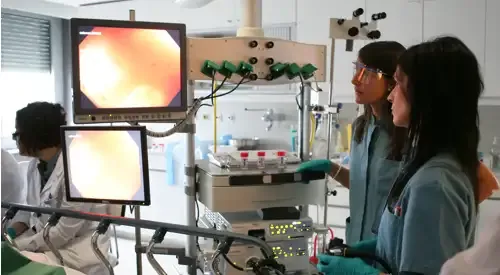Peptic or Gastric Ulcer
"Peptic ulcer appears due to an imbalance between aggressive forces (acid) and defensive forces (mucus barrier)".
DR. RAMÓN ANGÓS
SPECIALIST. DIGESTIVE DEPARTMENT

What is a stomach ulcer?
Peptic or gastric ulcer is a loss of substance, usually round or oval in appearance, which occurs in regions of the digestive tract that are exposed to the action of acid. It mainly affects the stomach and duodenum.
The presence of acid in these areas is necessary for the digestion of food, so under normal conditions, there is a barrier that protects the walls of these organs from the action of acid.
When an imbalance occurs, the layer of the stomach's mucous membrane begins to erode, causing an ulcer which leads to the characteristic symptoms and which, if it continues to evolve, can also lead to digestive bleeding.

What are the symptoms of a stomach ulcer?
The main symptom or manifestation of gastric ulcer is pain.
Most of the time the pain in the people who suffer from stomach ulcer has some typical characteristics that make suspect the existence of this disease and they are: the pain is located in a point in the mouth of the stomach, it appears approximately two or three hours after the meals and it calms with the ingestion of food or antacids.
Vomiting, heartburn, heaviness after meals and slow digestions may also appear.
The most frequent complications that peptic ulcer can present are: digestive bleeding, perforation and obstruction.
The most common symptoms of stomach ulcers are
- Pain in the pit of the stomach
- Acidity
- Heaviness after meals
- Slow digestions
Do you have any of these symptoms?
You may have a stomach ulcer
What causes a stomach ulcer?
Gastric or peptic ulcer appears due to an imbalance between aggressive forces (acid) and defensive forces (mucus barrier).
Although there are many factors that can produce this imbalance, most of the time it is produced by the presence of a germ (Helicobacter pylori) and by the consumption of anti-inflammatory drugs.
Tobacco also has a negative influence.
What is your prognosis?
Peptic ulcers have a tendency to reappear if left untreated. If the patient follows the treatment instructions offered by the doctor and takes all the medications as directed, the Helicobacter pylori infection will probably be cured and the patient will be much less likely to have another ulcer.
Who can suffer from peptic ulcer?
This disease is very common in developed countries, so it is said that up to 10% of people will suffer from it at some point in their lives. Currently, it seems to affect both sexes equally.
Duodenal ulcer is diagnosed on average around the age of 40, although many patients start their symptoms in the third decade.
Gastric ulcer tends to be diagnosed at a later age, on average at 55.
How is a stomach ulcer diagnosed?

The best test to diagnose an ulcer today is the upper endoscopy or gastroscopy.
Gastroscopy consists of a flexible tube with a built-in camera, so that the walls of the stomach and duodenum can be seen clearly. With gastroscopy, the location, size, shape and presence of other associated lesions can be known.
In addition, it is possible to take biopsies through the gastroscope. The latter is very important, especially for gastric ulcers, since it allows us to know the nature of the ulcer and to say if it is benign or malignant.
It also allows detecting the presence of Helicobacter pylori, a bacterium that promotes the appearance of ulcers in the stomach.
How is a stomach ulcer treated?
We have extensive experience in the diagnosis and treatment of patients with ulcerative lesions
Currently, we have very effective drugs capable of relieving the symptoms of the ulcer and facilitating its healing. On many occasions, it will be necessary to add antibiotics to the treatment to kill the germs that may be influencing the appearance of the ulcer.
Before starting a treatment, it is necessary to know if it is a benign or malignant ulcer.
In the case of a malignant ulcer, the treatment must be different (often surgery is necessary).
Where do we treat it?
IN NAVARRE AND MADRID
The Department of Digestive
of the Clínica Universidad de Navarra
The Digestive Department of the Clinica Universidad de Navarra is composed of a multidisciplinary team of specialists who are experts in the diagnosis and treatment of diseases of the digestive tract.
Our objective is that each diagnosis be carefully established and the treatment plan adjusted to each patient.

Why at the Clinica?
- Medical specialists who are national references.
- Specialized nursing team.
- Endoscopy Unit and High Risk Digestive Tumor Prevention and Consultation Unit to offer the best care to our patients.















